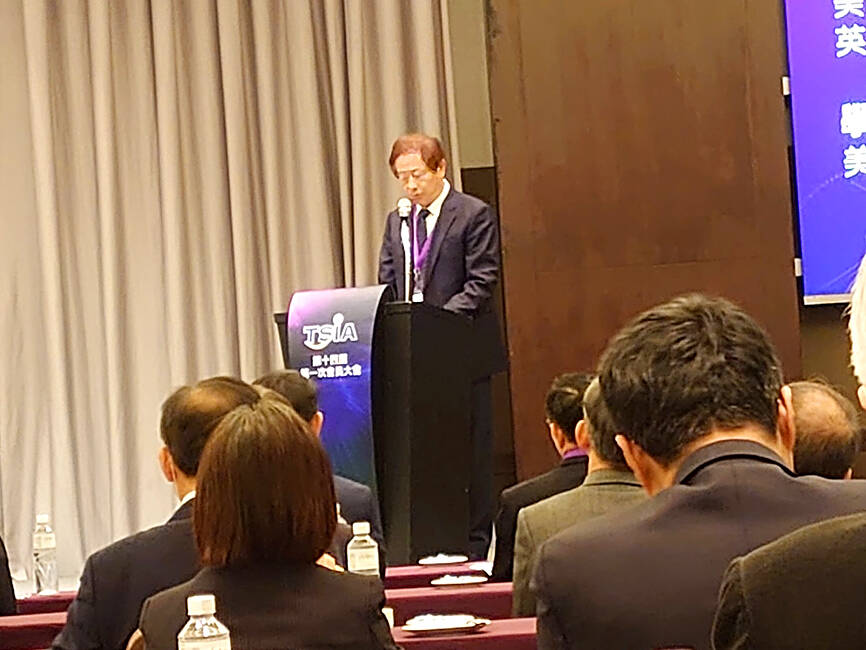Taiwan Semiconductor Manufacturing Co (TSMC, 台積電) yesterday called on the government to provide more equipment essential to advanced chipmaking, as it seeks to shore up its critical role in a US$550 billion industry.
Taiwan needs to build a fuller domestic semiconductor supply ecosystem, TSMC chairman Mark Liu (劉德音) told a conference organized by the Taiwan Semiconductor Industry Association.
Liu made the remarks in his farewell speech as chairman of the association. He is to be succeeded by TSMC vice president Cliff Hou (侯永清), who was elected yesterday.

Photo: CNA
US sanctions are curtailing the flow of vital technology to China, and Taiwan could play a bigger role in the global supply of machines needed to make chips, Liu said.
The TSMC chairman called on the government to assist Taiwan’s semiconductor companies to develop crucial technologies and enhance their capabilities to produce high-end semiconductor equipment and materials, saying it would help the nation fend off growing competition from China.
The US tightened its curbs on advanced semiconductor technology and equipment exports to China, which could change China’s role in local semiconductor component supply, Liu said.
The government should help businesses build a comprehensive semiconductor ecosystem to produce high-end manufacturing equipment and components, he said.
Liu said that some clauses in application guidelines for chip investment subsidies under the US’ CHIPS and Science Act are unacceptable.
South Korean memorychip maker SK Hynix Inc yesterday said that the application process is too demanding.
The South Korean government yesterday also said that the requirements that applicants disclose detailed technical and financial information, usually considered trade secrets, are onerous.
The US government demands that companies applying for subsidies under the CHIP and Science Act submit files containing information on how they calculate profits, the BusinessKorea magazine reported on Wednesday.
“We are still in discussions [with the US Department of Commerce]. Some conditions are unacceptable,” Liu said. “We hope [the department] will make some adjustments.”
The chipmaker’s operations in Taiwan would not be adversely affected by the US investment rules, Liu said.
TSMC, the world’s biggest contract chipmaker, has pledged to double its US investment to US$40 billion, as it is planning to build two advanced chip fabs in Arizona.
The first fab is scheduled to begin producing chips on 4-nanometer nodes next year, while the second is to start producing 3-nanometer chips in 2026.

AGING: As of last month, people aged 65 or older accounted for 20.06 percent of the total population and the number of couples who got married fell by 18,685 from 2024 Taiwan has surpassed South Korea as the country least willing to have children, with an annual crude birthrate of 4.62 per 1,000 people, Ministry of the Interior data showed yesterday. The nation was previously ranked the second-lowest country in terms of total fertility rate, or the average number of children a woman has in her lifetime. However, South Korea’s fertility rate began to recover from 2023, with total fertility rate rising from 0.72 and estimated to reach 0.82 to 0.85 by last year, and the crude birthrate projected at 6.7 per 1,000 people. Japan’s crude birthrate was projected to fall below six,

US President Donald Trump in an interview with the New York Times published on Thursday said that “it’s up to” Chinese President Xi Jinping (習近平) what China does on Taiwan, but that he would be “very unhappy” with a change in the “status quo.” “He [Xi] considers it to be a part of China, and that’s up to him what he’s going to be doing, but I’ve expressed to him that I would be very unhappy if he did that, and I don’t think he’ll do that. I hope he doesn’t do that,” Trump said. Trump made the comments in the context

SELF-DEFENSE: Tokyo has accelerated its spending goal and its defense minister said the nation needs to discuss whether it should develop nuclear-powered submarines China is ramping up objections to what it sees as Japan’s desire to acquire nuclear weapons, despite Tokyo’s longstanding renunciation of such arms, deepening another fissure in the two neighbors’ increasingly tense ties. In what appears to be a concerted effort, China’s foreign and defense ministries issued statements on Thursday condemning alleged remilitarism efforts by Tokyo. The remarks came as two of the country’s top think tanks jointly issued a 29-page report framing actions by “right-wing forces” in Japan as posing a “serious threat” to world peace. While that report did not define “right-wing forces,” the Chinese Ministry of Foreign Affairs was

PREPAREDNESS: Given the difficulty of importing ammunition during wartime, the Ministry of National Defense said it would prioritize ‘coproduction’ partnerships A newly formed unit of the Marine Corps tasked with land-based security operations has recently replaced its aging, domestically produced rifles with more advanced, US-made M4A1 rifles, a source said yesterday. The unnamed source familiar with the matter said the First Security Battalion of the Marine Corps’ Air Defense and Base Guard Group has replaced its older T65K2 rifles, which have been in service since the late 1980s, with the newly received M4A1s. The source did not say exactly when the upgrade took place or how many M4A1s were issued to the battalion. The confirmation came after Chinese-language media reported